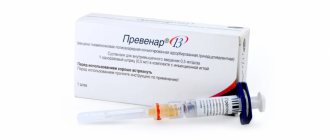The vaccine, called Pneumovax 23, is used to prevent pneumococcal infection, which combines a number of diseases caused by pneumococcus, a type of streptococcus.
This infection is quite common, due to the ease of transmission of microbes and their resistance to many antibiotic drugs.
Pneumococci cause the development of diseases such as:
- pneumonia (pneumoniae);
- ear disease (otitis);
- bacterial meningitis;
- pleurisy;
- endocarditis;
- arthritis.
Neither adults nor children can avoid infection, therefore, to effectively prevent its carriage or development of the disease, vaccination with Pneumovax 23 is necessary.
When should the Pneumovax 23 vaccine not be given?
- if the test results do not comply with the standards
- at elevated temperature in a child
- in case of intolerance to the components contained in the Pneumovax 23 vaccine
- during exacerbation of chronic diseases
- in other cases mentioned by the pediatrician before vaccination
Additional Information
Is it possible to purchase Pneumovax 23 from us or where to buy Pneumovax 23 in Moscow?
Family Medical does not sell the Pneumovax 23 vaccine, we vaccinate.
Where to get vaccinated with Pneumovax 23 in Moscow?
You can get vaccinated with Pneumovax 23 at a medical clinic, the Pneumovax 23 vaccine is available. Vaccination requires a mandatory examination before vaccination, the vaccination itself and observation after vaccination.
Call us, we will tell you everything in more detail
PricesSpecialistsSign upContacts
| Name of service | |
| Reception | |
| Examination by a doctor before vaccination | 1600 |
| Examination by a doctor before tuberculin diagnostics | 800 |
| TUBERCULIN DIAGNOSIS | |
| Tuberculin (Mantoux test) | 1200 |
| Diaskintest (testing) | 2800 |
| PREVENTION OF HEPATITIS B | |
| Engerix B (for children) - vaccination against hepatitis B | 900 |
| Engerix B (for adults) - vaccination against hepatitis B | 1000 |
| Regevak B - vaccination against hepatitis B | 900 |
| Combiotech - vaccination against hepatitis B | 900 |
| PREVENTION OF WHOOPING COUGH, DIPTHERIA, TETANUS, POLIOMYELITIS | |
| Infanrix hexa - vaccination against polio, Hepatitis B, tetanus, whooping cough, diphtheria, Haemophilus influenzae infection | 4700 |
| Pentaxim - vaccination against polymyelitis, tetanus, whooping cough, diphtheria, hemophilus influenzae | 3000 |
| Tetraxim - vaccination against polio, tetanus, whooping cough, diphtheria | 3500 |
| Infanrix - vaccination against tetanus, whooping cough, diphtheria | 3000 |
| DTP - vaccination against tetanus, whooping cough, diphtheria | 700 |
| PREVENTION OF POLIOMYELITIS | |
| Poliorix - vaccination against polio | 1200 |
| Imovax polio - vaccination against polio | 1200 |
| BiVac - vaccination against polio | 600 |
| Polimilex - vaccination against polio | 2500 |
| PREVENTION OF DIPTHERIA, TETANUS | |
| ADS - vaccination against tetanus and diphtheria | 600 |
| ADS-M - vaccination against tetanus and diphtheria | 600 |
| PREVENTION OF MEASLES, RUBELLA AND MUMPS | |
| Priorix - vaccination against measles, rubella, mumps | 1200 |
| M-M-P II (MMR-II) - vaccination against measles, rubella, mumps | 2000 |
| ZhPKV - vaccination against measles, mumps | 800 |
| Rubella - vaccination against rubella | 600 |
| LCV - vaccination against measles | 550 |
| PREVENTION OF CHICKENPOX | |
| Varilrix - vaccination against chickenpox | 5000 |
| PREVENTION OF HEMOPHILUS INFECTION TYPE B | |
| Act-Hib - vaccination against Haemophilus influenzae type B | 1300 |
| Hiberix - vaccination against Haemophilus influenzae type B | 1200 |
| PREVENTION OF ROTAVIRUS INFECTION | |
| RotaTek - vaccination against rotavirus infection | 3900 |
| PREVENTION OF MENINGOCOCCAL INFECTION | |
| Meningo A+ C - vaccination against meningococcal infection | 2000 |
| Mencevax - vaccination against meningococcal infection | 2500 |
| Menactra - vaccination against meningococcal infection | 6000 |
| PREVENTION OF PNEUMOCOCCAL INFECTION | |
| Prevenar 13 - vaccination against pneumococcal infection | 3900 |
| Pneumo 23 - vaccination against pneumococcal infection | 4400 |
| Pneumovax 23 - vaccination against pneumococcal infection | 4400 |
| PREVENTION OF HUMAN PAPILLOMA VIRUS | |
| Gardasil - vaccination against human papillomavirus | 9500 |
| Cervarix - vaccination against human papillomavirus | 7500 |
| PREVENTION OF HEPATITIS A | |
| Avaxim 80 - vaccination against hepatitis A | 2000 |
| Avaxim 160 - vaccination against hepatitis A | 2500 |
| Havrix 720 - vaccination against hepatitis A | 2000 |
| Havrix 1440 - vaccination against hepatitis A | 2700 |
| PREVENTION OF HEPATITIS TICK-BORNE ENCEPHALITIS | |
| FSME (for children) - vaccination against tick-borne encephalitis | 1600 |
| FSME (for adults) - vaccination against tick-borne encephalitis | 2000 |
| Tick-E-Vac - vaccination against tick-borne encephalitis | 1000 |
| EnceVir - vaccination against tick-borne encephalitis | 1000 |
| FLU PREVENTION | |
| Vaxigrip - flu vaccination | 1000 |
| Influvac - flu vaccination | 1000 |
| Ultrix - flu vaccination | 1000 |
| Ultrix Quadri - flu vaccination | 1000 |
Call us, we will tell you everything in more detail
Composition and use of the vaccine Pneumovax 23
The drug Pneumovax 23 is produced in Holland. Its release form is a disposable syringe with one dose of vaccine, the volume of which is 0.5 ml.
This dose is sufficient for one vaccination, regardless of the person’s age (from 2 years). The composition of the drug (polysaccharides and buffer-phenolic solution) ensures activation of immunity aimed at 23 types of pneumococcus.
How do you prepare for the Pneumovax 23 vaccination? Vaccination is carried out after an examination by a doctor, who first assesses your condition and health indicators and determines the need to administer the drug. No special preparation is required before the injection, but experts do not recommend administering the vaccine on an empty stomach or after heavy physical exertion.
After administering the vaccine, it is not advisable to take a bath, do cosmetic procedures or massage the limb where the vaccine was administered. The location of the vaccine is the shoulder or thigh, at the doctor’s choice. The vaccine is administered intramuscularly or subcutaneously.
The drug can be given simultaneously with other vaccinations, for example with DTP or the flu vaccine. The exception is the BCG vaccine. After the vaccine is administered, immunity develops at least a month later, which should be taken into account when determining the timing of vaccination.
Indications for vaccination "Pneumovax 23"
- Increased risk of developing pneumococcal disease, which is one of the leading causes of death worldwide and one of the leading causes of pneumonia, bacteremia, meningitis and otitis media in children over 2 years of age and in adults over 50 years of age.
- Children over 2 years of age who have chronic cardiovascular disease (including congestive heart failure and cardiomyopathy), chronic pulmonary disease (including chronic obstructive pulmonary disease and emphysema), or diabetes mellitus.
- Children over 2 years of age suffering from chronic liver disease (including cirrhosis) or leakage of cerebrospinal fluid.
- Children over 2 years of age with functional or anatomical asplenia (including sickle cell disease and splenectomy).
- Children over 2 years old living in special environmental conditions or special social conditions (including the peoples of the Far North).
- Children over 2 years of age with HIV infection, leukemia, lymphoma, Hodgkin's disease, multiple myeloma, advanced malignancy, chronic renal failure or nephrotic syndrome, persons receiving immunosuppressive chemotherapy (including corticosteroids), and recipients of bone marrow or transplantation organs.
- Routine vaccination of persons aged 50 years and older.
- People suffering from alcohol addiction.
- Persons with asymptomatic or clinically evident HIV infection should be vaccinated as soon as possible after diagnosis.
Preparing a child for vaccination
For successful immunization and minimizing side effects, the baby must be prepared in advance and follow some rules before and after vaccination:
- It is necessary to undergo an examination by a pediatrician and neurologist in advance. Possible reasons for delaying vaccination include: acute viral and bacterial diseases, severe anemia, high fever, etc. After eliminating the acute form of the disease, immunization is carried out according to the course;
- Avoid hypothermia and overheating;
- Prepare in advance for a possible increase in temperature (have paracetamol or ibuprofen at home). Fever is a predicted response to vaccination;
- After the injection, remain under medical supervision for at least 30 minutes.
All the vaccines we use comply with WHO standards, which guarantees their effectiveness, safety and reduced risk of side effects.
Compatibility with other vaccines
The pneumococcal vaccine Pneumovax 23 can be given at the same time as the flu vaccine (which is given in the other arm). Such administration does not lead to an increase in the frequency of side effects or a decrease in the intensity of the immune response to the administration of each of the vaccines.
The pneumococcal vaccine can be administered simultaneously (on the same day) with other vaccines (except for vaccines to prevent tuberculosis) in different parts of the body using different syringes.
The Pneumovax 23 vaccine can be administered no earlier than 4 weeks after Zostavax vaccination.
Description of the vaccine Pneumovax 23 (Pneumovax 23) and its composition
Vneumovax 23 (Pneumovax 23) is a multicomponent vaccine aimed at developing stable immunity to pneumococcal infections.
Experience of use in the world is more than 30 years.
One injection of the drug consists of:
1. Streptococcus pneumoniae polysaccharides, 25 mcg each:
- serotype 1;
- serotype 2;
- serotype 3;
- serotype 4;
- serotype 5;
- serotype 6B;
- serotype 7F;
- serotype 8;
- serotype 9N;
- serotype 9V;
- serotype 10A;
2.Excipients.
The vaccine is administered intramuscularly or subcutaneously.
Country of origin: USA.
Pneumococcal vaccine "Prevenar 20": how it works
Streptococcus pneumoniae is the leading cause of community-acquired pneumonia, responsible for more than 2 million deaths per year, especially among children, the elderly, and those with weakened immune systems. The disease usually occurs without bacteremia (without the presence of bacteria in the blood), although in a quarter of cases an invasive pneumococcal infection develops, characterized by infection of usually sterile areas.
Immunological protection against pneumococcal infection is achieved through opsonophagocytic antibodies against capsular polysaccharides of S. pneumoniae, which determine the serotypes of this bacterium and serve as virulence factors. Vaccines consisting of purified capsular polysaccharides have become available over 50 years ago. The 23-valent Pneumovax 23, the first such vaccine against pneumonia, was proposed in 1983.
The protective efficacy of vaccines can be enhanced by conjugating a bacterial polysaccharide to an immunogenic carrier protein. In the case of Prevenar 20 (as well as Prevenar 13), each of the pre-purified 20 capsular antigens of S. pneumoniae is chemically activated and linked to the diphtheria toxoid CRM197 (this protein is highly immunogenic, but not toxic), forming a glycoconjugate, which in turn undergoes a cleaning procedure. After administration of Prevenar 20, the immune system begins to produce functional antibodies that carry out opsonophagocytic destruction of S. pneumoniae during infection.
This combination causes a significantly stronger immune response (compared to Pneumovax 23) and does this by recruiting CRM197-specific T-helper type 2 cells, which switch the type of immunoglobulin (in order to produce non-IgM immunoglobulins) and organize the synthesis of B -memory cells. Mucosal immunity also develops and, ultimately, lifelong immunity after multiple exposures.
Indications and contraindications for the Pneumovax 23 vaccine
Pneumovax 23 is not a mandatory vaccine, so vaccination is carried out at will or for medical reasons. Vaccination is indicated:
- patients over 2 years old;
- patients who have been in specialized medical institutions for a long time;
- people under the age of 65 with at least one chronic disease of the kidneys, bronchi and lungs, heart and blood vessels;
- smokers and alcoholics;
- patients suffering from cirrhosis or hepatitis;
- for diabetes mellitus;
- in case of any type of immunodeficiency;
- people whose spleen has been removed;
- frequently ill children under 5 years of age; children with anemia.
Contraindications for vaccination can be complete or relative. The vaccine should not be administered if you are allergic to any component of the drug.
It is not recommended to use Pneumovax 23 at high temperatures, acute and chronic diseases during exacerbation, and the first two trimesters of pregnancy.
If the vaccination is given for prophylactic purposes, the drug is administered once, which provides protection against infection for a 5-year period.
Revaccination with Pneumovax 23 is carried out after 3–5 years, which depends on the patient’s health condition and the doctor’s decision.
Contraindications
Only a doctor can decide whether PNEUMOVAX 23 is suitable for vaccination
Pneumovax 23 is contraindicated if there is a history of an allergic reaction to any component of the vaccine.
Vaccination with Pneumovax 23 is contraindicated in the following cases:
- Hypersensitivity to any component of the vaccine, including neomycin; symptoms of hypersensitivity to previous vaccine administration.
- Acute infectious and non-infectious diseases, exacerbation of chronic diseases are temporary contraindications for vaccinations, except in cases where, in the opinion of a doctor, delaying vaccination entails an even greater risk.
- Vaccination during chemotherapy or radiation therapy should be avoided.






